A Silver Lining
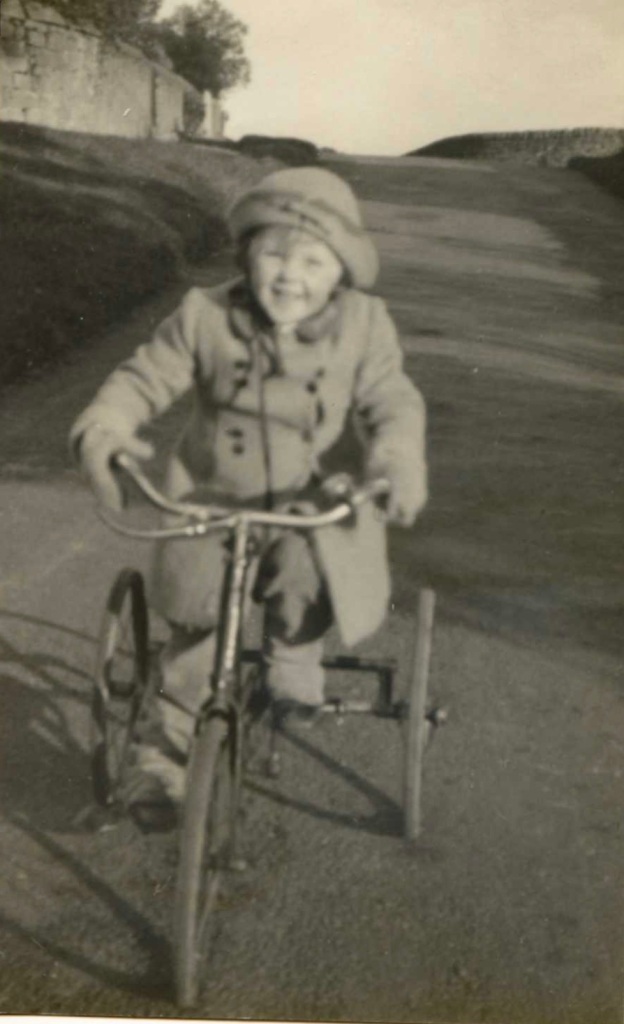
It’s been a horrible few weeks, but something that has been really positive about the whole experience has been reaching out to my extended family. Both my grandparents came from large families so there are a lot of us. Initially this was to let people know that Mum had passed away, then we shared memories of her.
I knew that my Mum, along with her mother, brothers and some of the cousins had been evacuated to the village of Ingoe during World War II, to escape the bombing in Newcastle. Shipyards, engineering works and factories making tanks and guns had made the city into a target.
One of Mum’s cousins, Pat, a lovely lady who I have not seen in years, has been exchanging emails with me. She and her brother, Michael were in Ingoe during the war with Mum. One of her grandchildren had done a school project about wartime evacuation and she’d written about it for him. She sent me this account along with some photographs and has very kindly allowed me to publish them here.
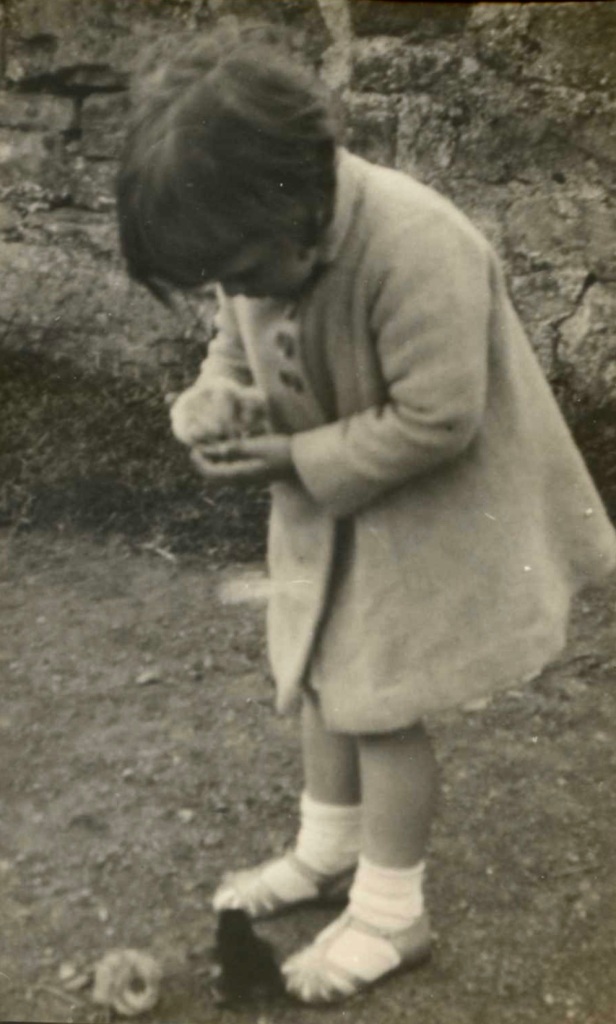
Evacuation in 1939
I was seven years old when the Second World War began and I lived with my parents and younger brother in Newcastle upon Tyne. My school had infant, junior and senior departments. Our parents were given the option to allow us to be evacuated from Newcastle which was thought to be a prime target for German bombers as it had a large shipbuilding industry as well as engineering works and associated factories making armaments. Railway links with Newcastle running north, south, and west were important and there was a large goods depot where food supplies and necessities were stored and where trains were maintained and repaired. Throughout England more than 3,000,000 children and adults were evacuated, from cities and towns, to areas which were deemed to be ‘safer’ in a scheme known as Pied Piper.
My mother volunteered to go as a helper with children from the school and my brother came too. Michael was three years old. I am sure that there must have been meetings for parents, and certainly information and lists, so that they knew what the children had to take with them, when and where everyone had to assemble but we were not told where we would be taken. On the morning of the evacuation we all went to school equipped with a case, or bag, containing underclothes, night clothes, slippers, socks, spare shoes, toothpaste and brush, soap, facecloth, towel and some warm clothes and with the all-important gas mask in a box attached to a long string which went around our necks. I think that we were all wearing warm coats to which a label was pinned giving our names and ages and the name of the school from which we had been sent. We also carried something to eat on the journey.
In a very long crocodile we left the school fairly early in the morning and walked to the nearest railway station which was not far away (on Jesmond Road) accompanied by teachers and many helpers. My mother was not only responsible for Michael and me but she also had several other children to look after during the journey and I do remember that we all managed to fit into one railway compartment. Many parents accompanied us to the station but could not board the train so stood on the platform watching their children on the train. I think that there were lots of tears but generally we children were quite excited to be on a train.
The train left Jesmond Station, Newcastle when it was full and took us through Newcastle then, very quickly out west into the countryside. We must have travelled to Carlisle then south to the Lake District. It was quite a long journey but most children had a sandwich or piece of bread and cheese. There was a lot of unemployment on Tyneside and many very poor families so the sandwiches may have contained egg or cheese but there were many children on the trains who had just a piece of bread or a jam sandwich. Apples came out of many pockets and some had the luxury of a Kit Kat biscuit or another type of biscuit. We were given water to drink several times during the day and mother had brought some extra food and sweets to share with the children in our carriage. I think that we fell asleep for a while and in the afternoon we were aware that the countryside was different, we could see high hills and mountains. The train eventually reached Windermere and, I think that we were then taken, in buses, to Bowness on Windermere which was our destination and we walked to a school where lots of people were waiting for us. Because Michael and I were accompanied by a parent we were almost last to be allocated a place to stay and by that time we were all very tired. I am sorry that I did not ask my mother, when I was an adult, how she felt about the situation, how she related to the lady with whom we were living and how she felt about being away from her own home. She was kept very busy because two other children were with us and I know that she did a lot of the cooking and washing.
We were billeted with the head teacher of the primary school who lived in a large house opposite an open piece of land on which brambles grew and where blackberries were ripening in large quantities so that blackberry pies, crumbles and cakes were everyday items on the menu. We went to school each day but only for half a day as the school could not accommodate the resident population of children plus all the evacuees. The weather was lovely that September and we would walk down to the lake, paddle in the shallow water for a while, play in the sand and throw pebbles into the lake before walking back to the house for lunch or tea. There was no bombing during the first few weeks and months of the war and mother decided to take us back to Newcastle for a while.
I think that Uncle Ken [my grandfather] came to collect us because we made the journey by car and, at that time, my father could not drive because of a badly damaged ankle. Uncle Ken’s parents had a cottage twenty miles outside Newcastle where our Aunty Wyn [my grandmother] and Gillian [my mum], were already staying and within a few weeks Michael and I went to stay with them. Mother stayed at home with Dad but mother’s youngest sister (Jean) came with us to help look after us all. Aunty Jean was still quite young then and living with our Grandmother in Newcastle until she was old enough to join the WRAAF. The village in which the cottage stood was on a high outcrop of rock with views towards Newcastle and the coast so that on a fine day we could see a silver line on the horizon which was the North Sea.
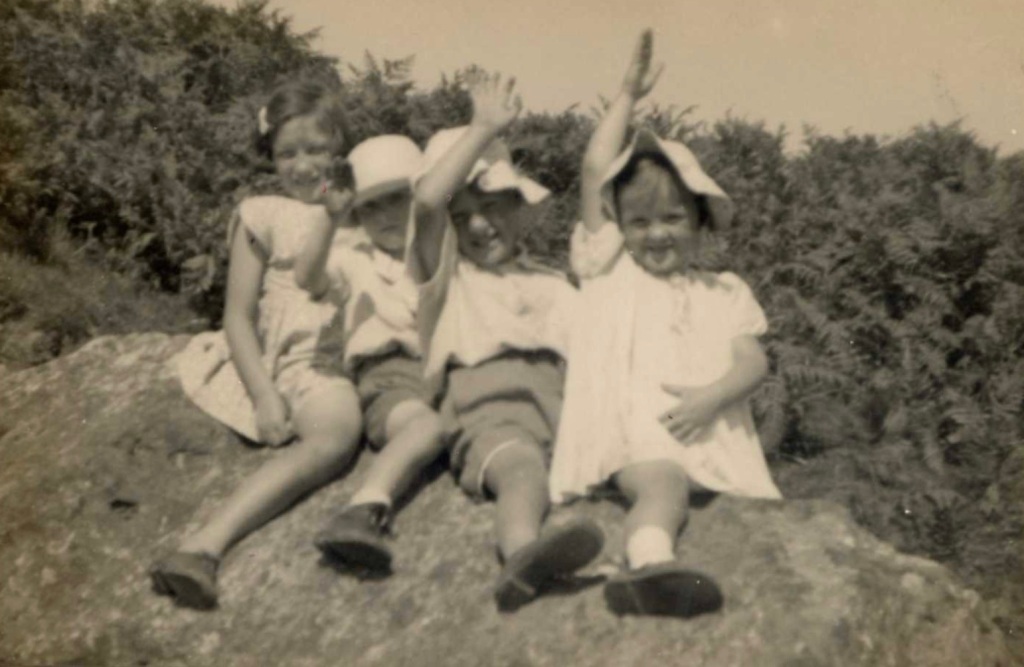
There were only about thirty cottages and half a dozen farms in the area plus a Methodist Chapel. There were no shops but a travelling shop called three times each week and I can still recall the very special smell that came from the back of the van when the driver opened the doors – the mingled smell of bread, meats, apples, vegetables, and paraffin for the lamps was very distinctive and I can still remember it today! On Thursdays a bus came at 9.30 and took people to Hexham to do their main shopping and brought them back at 3.30., we children never went on the bus. Another smell which reminds me of Ingoe is that of Phlox because there were clumps of pink Phlox in front of the house, there was also a Beech hedge and when I hear the breeze through the Beech hedge here in Cheltenham I am reminded of Ingoe. Smells! Pleasant and not so pleasant!
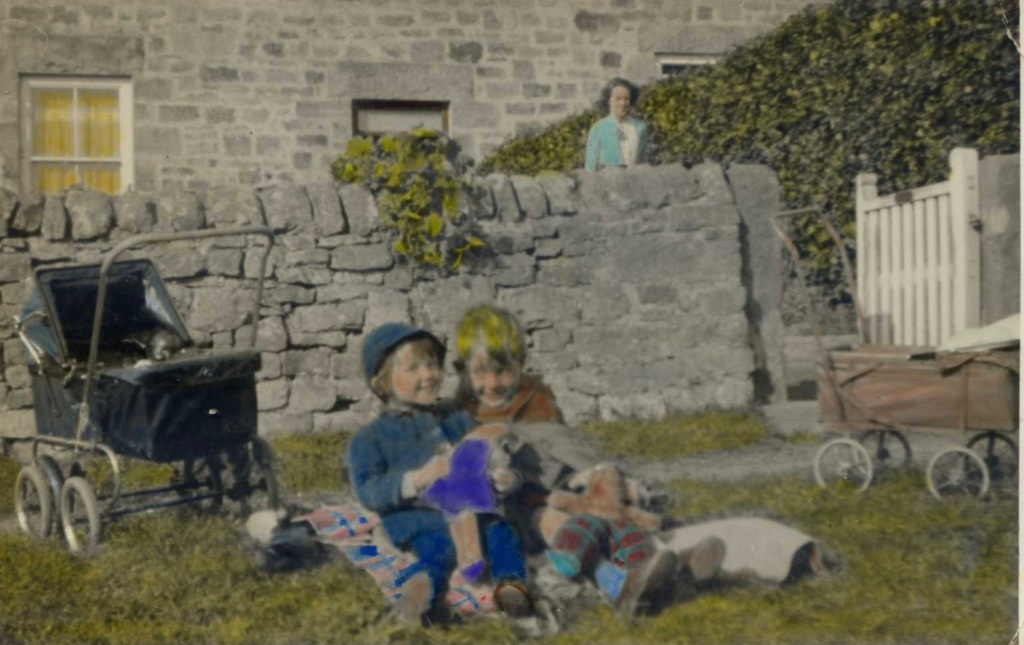
There was a school which took in children from the age of five to fourteen, which was the school leaving age then; the head teacher was Miss Robson and there was an assistant evacuee teacher whose name I cannot remember. There was only one large classroom for all the children and on the longest wall there was an enormous fire range which kept the room warm and provided us with hot water and sometimes, in the winter, soup for the children who could not go home for lunch. Many of the children had a long walk to and from school each day; they came from outlying farms and cottages. The toilets were outside and were very basic, smelly, draughty and cold and they had a distinctive smell too!
The village had no running water into the cottages and farms although some of the farms had wells. People in the village had to carry every drop of water that was needed from a tapped spring which lay at the bottom of a steep hill (I think that it was called The Pant!) and each child who was capable of doing so had to help to carry at least a little water. When evening came we lit Tilley (paraffin) lamps and candles so it was always early to bed even for the adults.
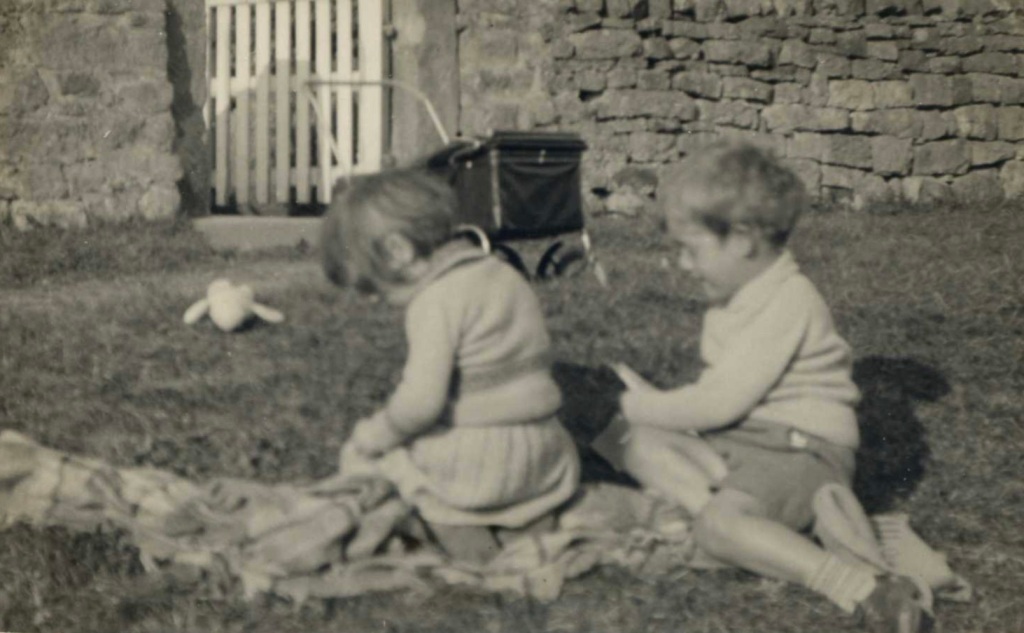
War seemed a long way away although we did sometimes see air battles in the distance and when there had been a night raid on Newcastle we could see the glow of large fires even though it was so far away. The night on which the goods station at Manors Railway Station was bombed the blaze was spectacular and could still be seen during the day. At school we were trained to run to a ditch or hedge and lie down with our hands over our heads and ears when we heard an aeroplane. Usually the planes were friendly as there was a small air field nearby where new pilots were trained but occasionally there were German planes in the vicinity.
Life must have been very difficult for Aunty Wyn but I don’t remember her being cross with us. Every house had one or two rainwater butts to collect water from the roofs for washing people and clothes but every drop of drinking water had to be carried in buckets from ‘The Pant’ which was a piped spring at the bottom of the steep road which was the only road into the village. An adult would carry two buckets and any child capable of carrying water was expected to help. Neighbours were helpful and generally kind. There were no indoor bathrooms/toilets; outside, at the back of the house there were two facing rows of cubicles each containing a wooden plank seat with a hole over a bucket! It was smelly in the summer and bitterly cold in the winter and the holes did seem quite large! Michael actually managed to lose his grip on the side of the hole and fell down into the bucket. Poor Aunty! Fortunately Aunt Florrie was staying at the time and she had to extricate him from the bucket then clean him up!! She was not amused. There were chamber pots under the beds and we washed in a bowl in the tiny kitchen or had a bath in a tin bath into which hot water from the ‘range’ was poured – sometimes the tin was a bit hot I do remember that! We had Tilley lamps and candles for lighting and a coal/wood burning range in the living room for heat and for cooking. There was always a kettle of water on the hob and the oven was usually warm, or hot for cooking. I don’t remember much about the food except that we had a lot of vegetable soups sometimes flavoured with chicken stock from boiled bones.
My mother came at the weekends and always brought some ‘goodies’ for us all and clean clothes for three children. Uncle Ken still had a car so was able to come most weekends and he was the one who had the unenviable task of emptying our toilet bucket! When we knew that he would be coming we would be outside listening for his car which we could hear before we could see it. I do remember the utter silence on most days although, of course, there were plenty of farms around the village so there were a few tractors. Most of the farms still used horses with ploughs and the hay was often still cut by men with scythes although some was cut mechanically. We bought our milk from Pasture House Farm where Mr and Mrs Temple lived and they became firm friends and were very kind to us. Sometimes they would give us a couple of free eggs or a few rashers of bacon. Another farm was Sandyway Heads which was farmed by the son of the largest nearby farm but I can’t remember the name of that farm or of the farmers.
I loved the country and the freedom that I had to roam fields and play in the bracken on the South Crag. School was very relaxed! We younger children were often looked after by the older girls who just ‘mothered’ us and read to us – if they could read themselves. Michael and Gillian were too young to go to school so were looked after by Aunty Wyn. I wish that I had talked to her too about those days! I also wish that I had thanked her for her care during the time we were with her.
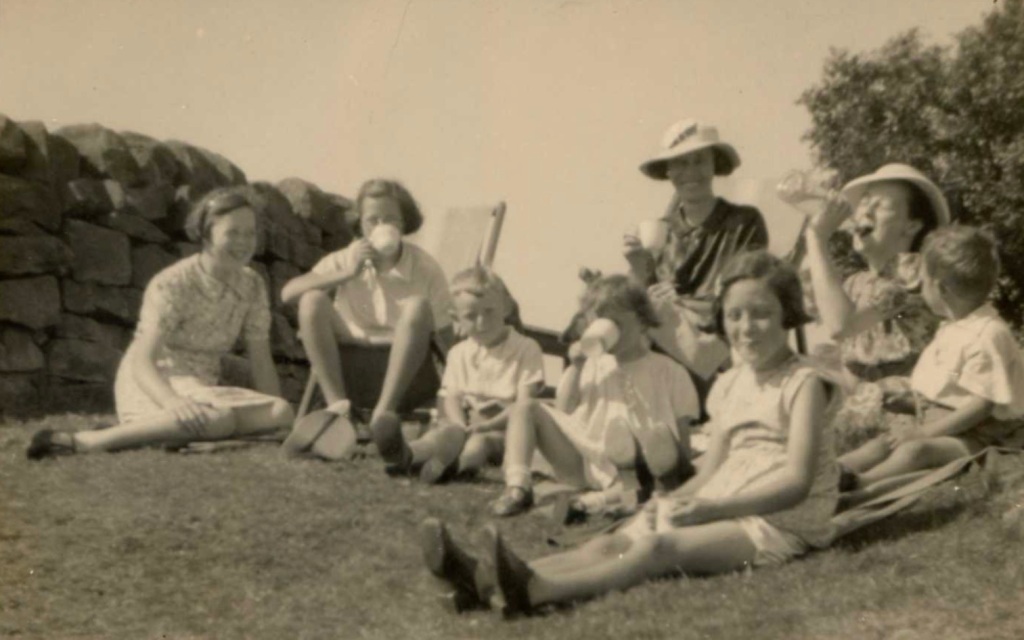
I’m so grateful to Pat for sending me this. She has an incredible memory! It has given me so much insight into what My mother experienced during this time – she was very young (just 2 years old when war broke out), so she could only just remember some of it. Pat has written such an amazing account, not only a fascinating social document, but a piece of my family’s history that I will cherish.
The photos Pat sent include this one of the cottage. It still stands and can be seen on Google Map Street View – little has changed
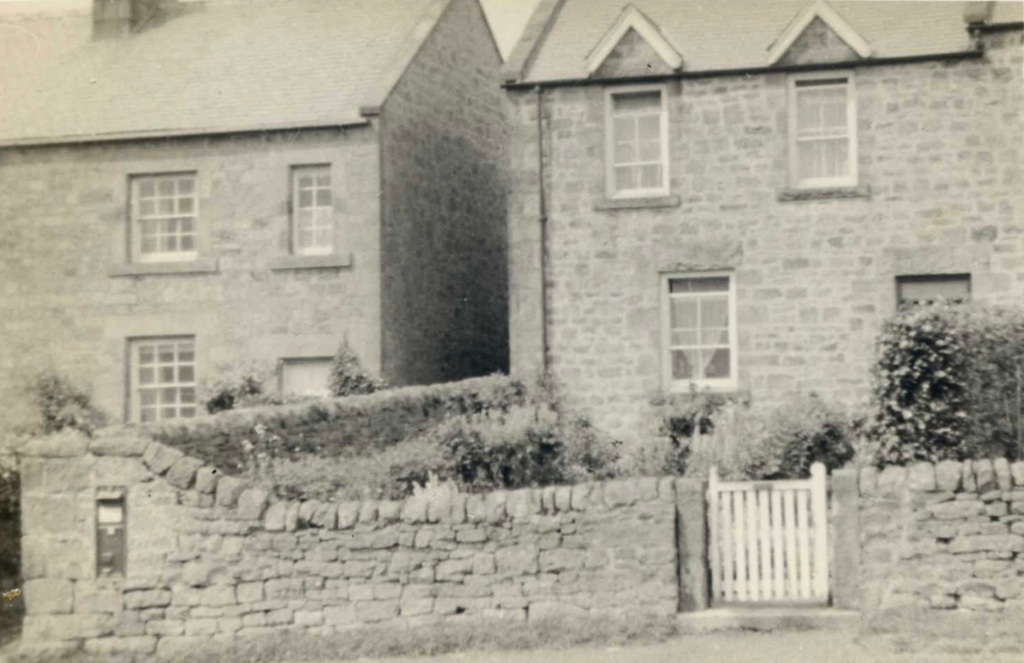
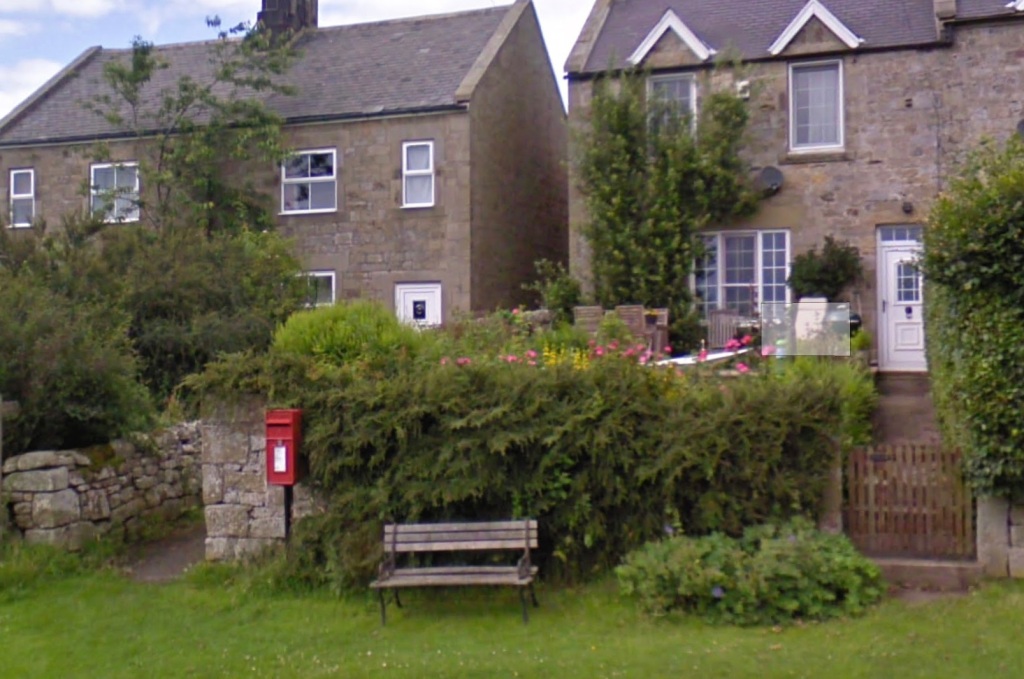
Another unexpected connection that I discovered after the last two blog posts were published is that one of my blog subscribers is the mother-in-law of one of my cousins (Hello Cathy!). She is a keen genealogist and has traced my ancestors several generations back from back from my grandfather (Uncle Ken in Pat’s account). Cathy has offered to send me further details. How amazing is that?
All this is really helping me find something really positive at what has been a very sad time – I’m learning more of my family’s history and it’s so interesting.
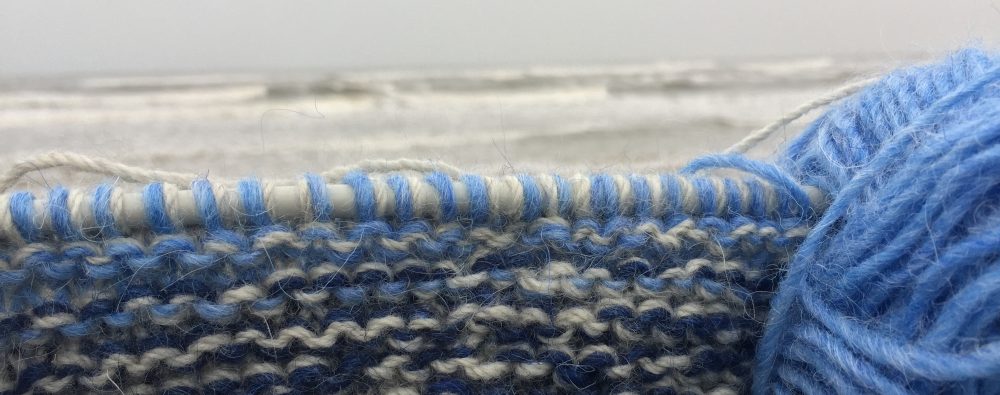
That is a little bit of a silver lining, it is too bad that is takes someone’s passing to reconnect but that happened when my father died. It seems like long lost relatives came out of the woodwork! It was wonderful to connect with them and see old photos and hear their stories. I appreciate reading you and your families stories from the Second World War. People were so amazingly brave!
LikeLike
I’ve loved reading those wartime stories!
LikeLiked by 1 person
It is sad that we wait until someone we love passes away to reconnect with more distant family, and it resets all our priorities. But learning about our predecessors always helps understand who our parents and grandparents and farther back were. Family history is a rabbit hole that will bring a lot of interesting info about your family. My sister got all my mom’s pictures that she had collected (she was very into family history) and has been sharing them with me, and I am enjoying them very much. May all the sharing with family bring you some comfort and happy memories.
LikeLike
It is fascinating. My cousin is in possession of an old family photo album from the 30s and 40s. She’s scanned every page and put everything on a shared drive so we can all access it, which is brilliant.
LikeLiked by 1 person
What great stories to hear from your relative. I found myself relieved their mother was going with them on the train. I can’t imagine having to send one’s children away. We now know that some evacuees had a lovely time and better food, while others were mistreated.
LikeLiked by 1 person
iIt’s such a brilliant account, and I feel privileged that it’s part of my family’s history. I’m happy that Mum and her cousins enjoyed their time being evacuated to the country side when so many were less fortunate and you say.
LikeLiked by 1 person
How cool to have this history given to you, and to find out more about your wonderful Mum’s childhood during the War. I’ve read all 3 of your goodbye posts and found them so moving. She sounds like a great lady.
LikeLiked by 1 person
Thank you. Writing has really helped me get through this difficult time. She was amazing and always be in our hearts.
LikeLiked by 1 person